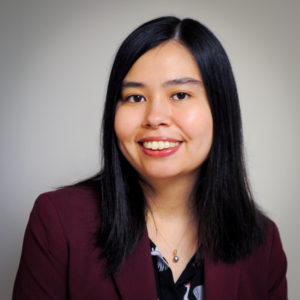 This post was written by Shelly Black (@ShellyYBlack), who was selected to be one of this year’s virtual DLF Forum Community Journalists.
This post was written by Shelly Black (@ShellyYBlack), who was selected to be one of this year’s virtual DLF Forum Community Journalists.
Shelly Black is the Cyma Rubin Library Fellow at North Carolina State University Libraries where she supports digital preservation in the Special Collections Research Center. She also works on a strategic project involving immersive technology spaces and digital scholarship workflows. Previously she was a marketing specialist at the University of Arizona Libraries and promoted library services and programs through social media, news stories, and newsletters.
Shelly was recently selected as a 2020 Emerging Leader by the American Library Association and is a provisional member of the Academy of Certified Archivists. She received a MLIS and a Certificate in Archival Studies from the University of Arizona where she was a Knowledge River scholar. She also holds a BFA in photography and minor in Japanese from the UA.
The weekend protests began in response to George Floyd’s murder, I was driving across the country for my first post-MLIS job. I listened to the radio, scrolled through the news and felt the country in pain. Reflecting on how volatile 2020 has been, I’m grateful that the DLF Forum was freely open to all and held online. As a graduate student, my exposure to digital curation and preservation focused on theory more than practice. So I was eager to learn about current strategies and tools. Considering the anti-racist commitments made recently by numerous organizations, I also looked forward to hearing about projects to improve discoverability of marginalized people in the historical record.
Many sessions covered computational methods used by librarians, archivists, and researchers to improve our understanding of, and increase access to, digitized materials. Juan Manuel García Fernández and Nickoal Eichmann-Kalwara presented on “Digital El Diario and Archival Justice in the Digital Humanities Graduate Classroom.” Their work involved creating a corpus from a digitized 1970s Chicanx newspaper and showing students how to use text analysis tools, such as MALLET and Voyant, for the purpose of historical recovery. In “Images as Data with Computer Vision,” Carol Chiodo shared that Harvard University Library is using a Python package to analyze and provide descriptive metadata at scale for photographic collections. This includes protest photography, so the project will also result in the creation of ethical guidelines for applying automation to sensitive materials.
Throughout the Forum, a theme that resonated with me was the ethics of care. I learned how multiple presenters have adopted this feminist approach that emphasizes relationships and considers power imbalances. During “Can We Digitize This? Should We? Navigating Ethics, Law, and Policy in Bringing Collections to Digital Life,” Stacy Reardon explained that she adopts an ethics of care when deciding whether to make materials available online. She noted how this framework urges us to consider the potential for harm not just to individuals but also communities. Lorena Gauthereau, one of the panel members of “US Latino DH: Recovering the Past, Creating the Future,” imparted that community outreach should be approached with an ethics of care. She said we have a responsibility to make the people represented in archives feel valued, which can be achieved through post-custodial methods, consent, decolonial spaces, and trusting relationships.
As a Mexican Japanese American, increasing representation and reclaiming the humanity of historically oppressed people has personal significance. I wholeheartedly agree with Gauthereau who expressed:
“By recovering the past, we can project toward our future. While working with recovered archives, we make space for healing by making visible not only painful histories, but also resistance, survival and joy, to acknowledge where we come from and where we are going.”
These presentations reminded me to think critically about the interplay between people, archival collections, and technology. While I see promise in the application of computational methods for understanding and expanding access to stories beyond the dominant narrative, I’m also wary of the challenges. Algorithms used for facial recognition, screening job applicants, and identifying high-risk patients continue to oppress communities of color. Mixed race people like myself don’t fall neatly into metadata categories and likely aren’t seen by algorithms applied to textual or visual corpora.
Meanwhile, libraries have started using machine learning for appraisal, description, and other laborious tasks. Many collections await being described—or re-described using anti-oppressive language—and made available online. Algorithms offer efficiency, but when people create them with training data which centers whiteness, they further harm communities.
Another challenge is the layering of biases when working with digitized collections. We lose more than visual details and aesthetic qualities through reproductive technologies and migration of formats. There are racial consequences. We scan photographs made from color film stocks originally calibrated for light skin. Art historian Lyneise Williams has also called attention to the erasure of Black people through the high contrast process of microfilming. So what happens when we use biased machine learning models to process images that inherit white normativity?
Growing digitized collections make the adoption of machine learning compelling. At the same time, an ethics of care and diverse voices are needed when new tools are being designed. Knowledge produced from analyzing collections at scale will only be as inclusive as the human beings who designed the algorithms and the digitized material’s source medium. As Stacey Patton reminded us in her keynote, digitization isn’t a be-all and end-all, particularly when there is still the digital divide. The DLF Forum inspired me to think about the opportunities and issues ahead. I hope to attend future Forums where discussions on using technology in ways which uplift communities of color continue.
